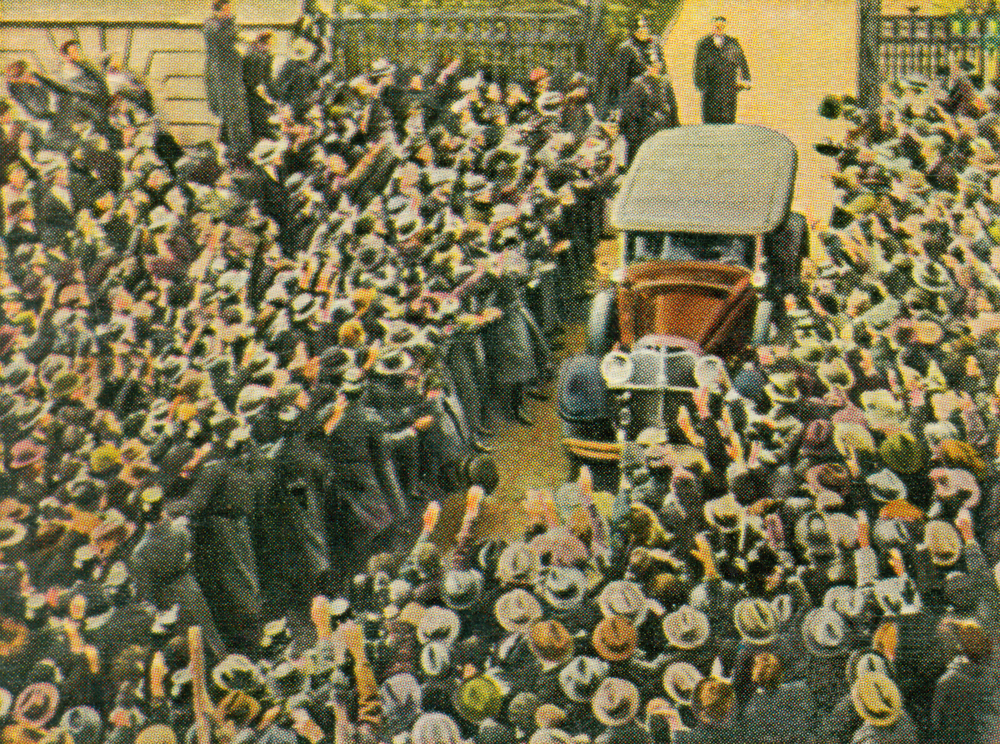
Economic theories of politics sound warnings against oppression and tyranny. The prospect may seem abstract and theoretical, but history provides many examples of idealized political leaders who turned out to be self-interested tyrants and betrayed the power that naive citizens had granted them. Here is a telling one.
At the end of the 19th century, many considered Germany to be the most advanced country in the world. It was at the first ranks of public health and the welfare state. Frederic C. Howe, an Ohio politician later associated with the FDR administration, “portrayed Germany as the world’s most advanced scientific state.” Many young economists who founded the American Economic Association in 1885 had studied there. (See Thomas C. Leonard, Illiberal Reformers, Princeton University Press, 2016.) It was still a sophisticated country as the Nazis were reaching for power. They were not ignorant barbarians.
In August 1934, Rudolf Hess of the Nazi Party gave a speech asking Germans voters to approve a referendum proposal about making Adolf Hitler both Führer and Chancellor. (The featured image of this post shows a cigarette card of the Nazi era.) One instructive excerpt from Hess’s speech:
Someone may say that it is not good to put all power in one hand, since Adolf Hitler might use his authority arbitrarily and thoughtlessly!
To that I can only say: The conscience of a moral personality is a far greater protection against the misuse of an office than is the supervision of parliament or the separation of powers. I know no one who has a stronger conscience, or is more true to his people, than Adolf Hitler.
In the referendum that followed a few days later, some 90% voted yes for Hitler. The future was to confirm that general human flourishing is served not by the power and “conscience of a moral personality” but, on the contrary, by strictly limited government and the coexistence of many centers of power in both government and society.

READER COMMENTS
David Seltzer
Apr 21 2021 at 3:45pm
Lord Acton writes to Bishop Creighton in a series of letters concerning the moral problem of writing history about the Inquisition. Acton believes that the same moral standards should be applied to all men, political and religious leaders included, especially since, in his famous phrase, “power tends to corrupt and absolute power corrupts absolutely”:
Mark Brady
Apr 21 2021 at 4:22pm
“The future was to confirm that general human flourishing is served not by the power and “conscience of a moral personality” but, on the contrary, by strictly limited government and the coexistence of many centers of power in both government and society.”
Pierre, how would you respond to someone who argued that the defeat of the Third Reich was achieved through the centralization of power in the hands of Churchill, Roosevelt and Stalin?
Pierre Lemieux
Apr 21 2021 at 6:31pm
Interesting question, Mark. This objection is based on counterfactual history: if power had not been centralized in America and the UK, Hitler would have won. I think a contrary counterfactual is easier to defend: if Churchill and Roosevelt had not transformed their societies into armed camps, not only the short-term war would have been won but also the long-term one between societies of free men and tyrannical states. We can apply to WWII what progressive Grosvernor Clarkson thought about WWI, during which he was member of the War Industries Board: he whats happy that the war planning effort had converted one hundred million “comparatively individualistic people into a vast cooperative effort in which the good of the unit was sacrificed to the good of the whole,” and that this development of collectivism had almost made war “appear a blessing instead of a curse.” Source: Thomas Leonard, Illiberal Reformers, and my Regulation review.
Roger McKinney
Apr 22 2021 at 11:02am
Clearly centralized power is necessary in war. Armies can’t work without it. But it’s a non sequitur to argue that because it’s necessary in war it’s necessary, or even good, for government in general. War has very limited, specific goals. Government is completely different.
Also, it’s interesting that D-Day in the minds of many historians, was a test to two military systems – the hierarchical German army and the decentralized US army. The German army couldn’t move without decisions from Hitler. The US army gave soldiers on the ground a lot of latitude in decision making. D-Day was a terrible plan according to MacArthur. But historians say the privates, corporals and sergeants on the beaches turned a terrible plan into a victory by making their own decisions. They came up with ingenious ways to thwart German defenses that the officers had never anticipated.
Pierre Lemieux
Apr 22 2021 at 1:27pm
Roger: But note that armies are only PART of government. + Interesting second paragraph.
Craig
Apr 23 2021 at 10:06am
“Also, it’s interesting that D-Day in the minds of many historians, was a test to two military systems – the hierarchical German army and the decentralized US army.”
Indeed that is an interesting comment. To expound on your point here I would suggest that one can see the difference between Germany’s defeat at Stalingrad and the Third Battle of Kharkov which was just after the Stalingrad debacle.
Comments are closed.